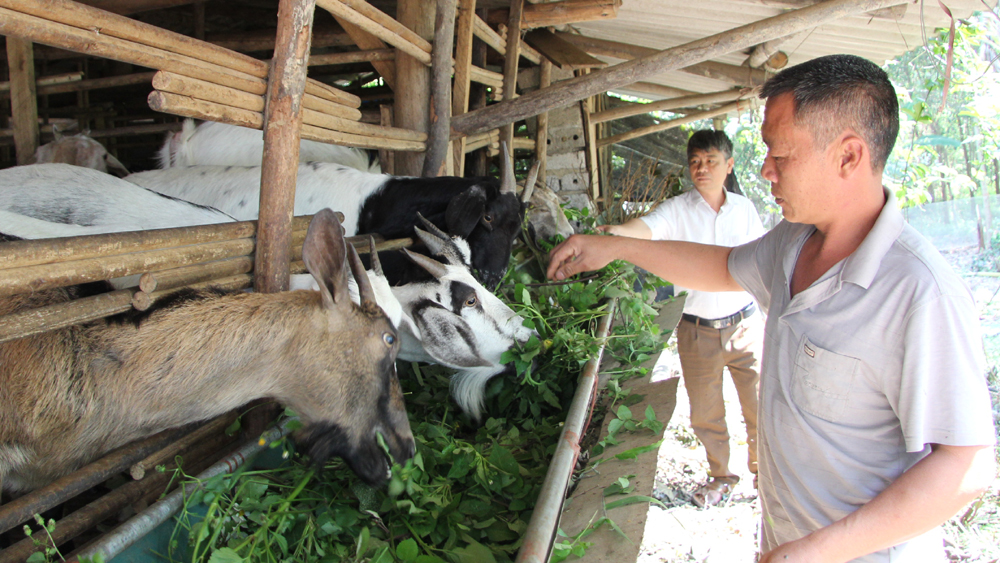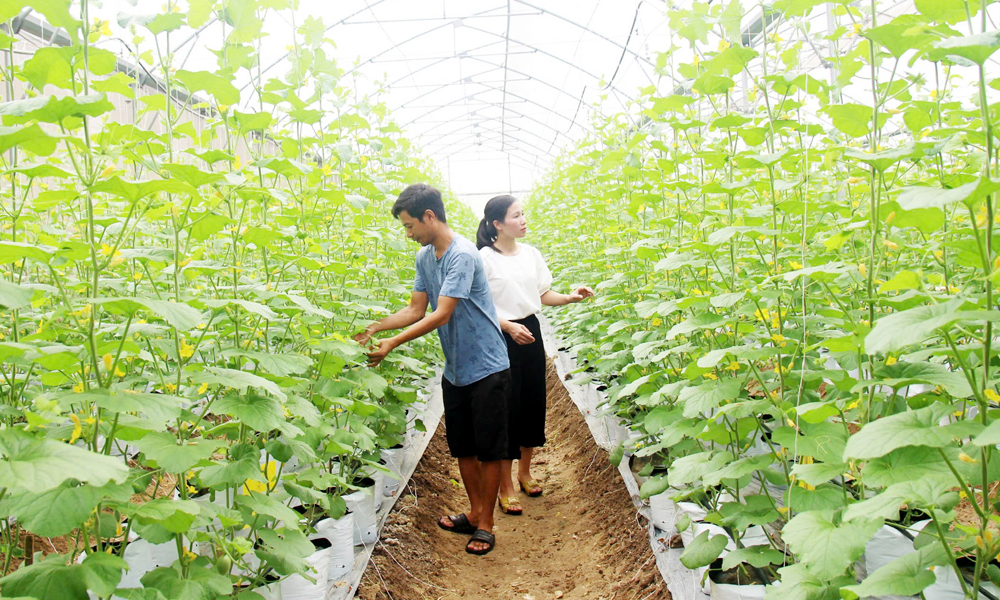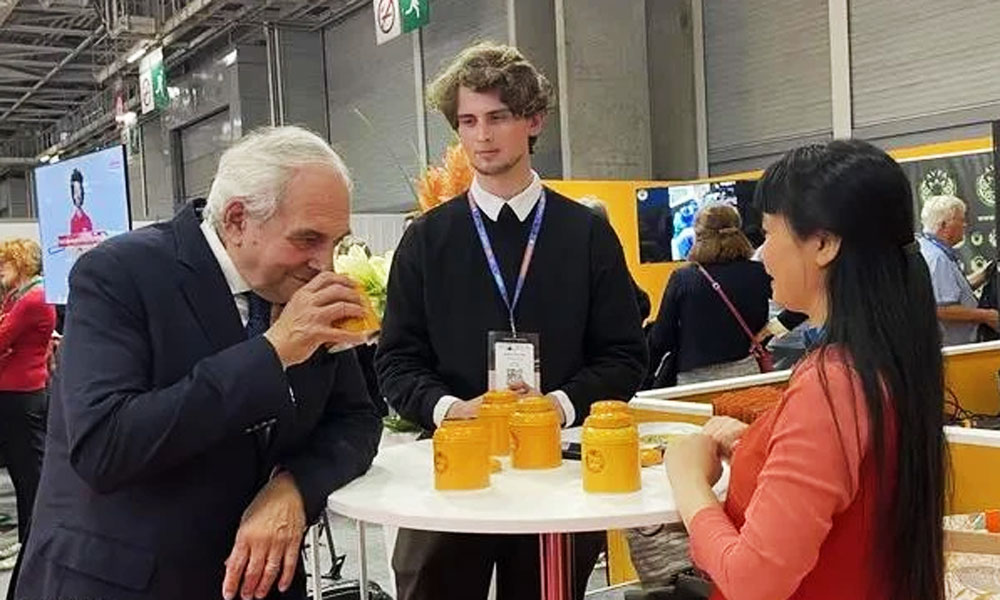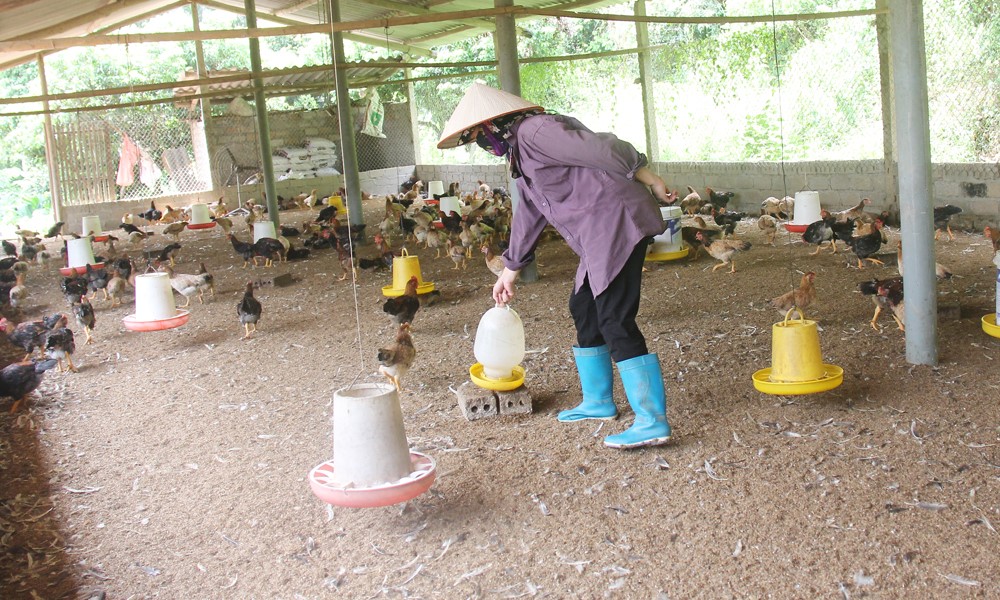Yen The diversifies livestock, improves product value
More than a decade ago, Yen The district was known for its hill chicken raising and economic afforestation. The district's chicken flock increased sharply and always ranked first in the province, sometimes reaching up to 4.5 million heads.
 |
|
Vu Xuan Thang in Cau Tu village, Hong Ky commune takes care of goats. |
However, raising chickens was not always "smooth" so the district People's Committee directed the specialized units to promptly grasp market information, guide the households to raise new herds reasonably; expand chicken raising area meeting VietGAHP and biosafety standards to effectively prevent epidemics, reduce input costs and improve product quality. Simultaneously, the district has step by step diversified livestock species in order to take advantage of land conditions, available food sources, and especially breeding experience.
Goat has been chosen by many households in Yen The district to raise. The family of Vu Xuan Thang in Cau Tu village, Hong Ky commune started farming goats in 2015. Initially, he raised commercial goats. The economic efficiency was quite high, but buying breeds was difficult sometimes, so from 2019, he switched to raising breeding goats to provide baby goats for households in the area. His family's herd has since been maintained stably with 20 mother goats. Every year, the family earns a profit of 60-70 million VND (2,620-3,000 USD) from raising goats.
To encourage goat-raising households, the district People's Committee issued a project to develop commercial goat herd associated with the construction of Yen The goat brand in the 2019-2020 period. As a result, the goat herd in the locality increased rapidly, reaching 9,500 heads in 2021, mainly in the communes of Hong Ky, Xuan Luong, Canh Nau, Dong Tien, Tan Soi...
In the district, deer farming has also been seen in Dong Huu, Dong Son, Xuan Luong and Huong Vi communes with a total herd of more than 550. The Yen The deer velvet product has been known by consumers inside and outside the province. Flocks of bees, pigs and cattle have also gradually developed. Last year, although the Covid-19 epidemic and unfavorable consumption of livestock products limited the re-herding, the district's live meat output of all kinds still reached 37,000 tonnes, including 20,000 tonnes of chicken meat.
Promoting that result, Yen The district determined to continue to develop husbandry and maintain 3.8 - 4 million chickens per litter (11-12 million heads per year); 10,000-12,000 goats; 500 - 600 deer; more than 10,000 bee colonies; and 10,000-12,000 buffaloes and cows.
The district People's Committee has directed specialized agencies and local authorities to strengthen communications to raise people's awareness of commodity production and disease prevention; promote science and technology transfer, encourage the application of high technology in production, and expand advanced livestock models. Mechanisms and policies to support livestock development have been implemented by the district.
|
Yen The district determined to continue to develop husbandry and maintain 3.8 - 4 million chickens per litter (11-12 million heads per year); 10,000-12,000 goats; 500 - 600 deer; more than 10,000 bee colonies; and 10,000-12,000 buffaloes and cows. |
In order to gradually improve the value of products, the district has paid attention to directing the building of production - consumption chains associated with key local products such as hill chicken, goat and bee honey production - processing - consumption chains; diversify livestock products, especially processed ones, in combination with the implementation of the One Commune One Product (OCOP) programme.
At present, many livestock products of the district have been recognized as OCOP products from 3 stars or more. Therefore, promoting and directing the introduction of signature products at supermarkets and trading floors nationwide continues to be focused with the goal of expanding the consumption market.
With the attention and direction of the authorities, relevant agencies and production support policies, livestock production in Yen The will surely develop sustainably, bringing high income to local people.
 Bắc giang
Bắc giang
















Reader's comments (0)